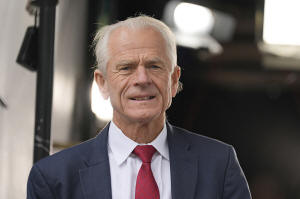Trump team tries to project confidence and calm after his tariff moves
rattled markets
[April 14, 2025] By
BILL BARROW
ATLANTA (AP) — Trump administration officials were out in force across
the television networks Sunday defending President Donald Trump’s
economic policies after another week of reeling markets that saw the
Republican administration reverse course on some of its steepest
tariffs.
Trump, meanwhile, said on his social media platform that there
ultimately will be no exemptions for his sweeping tariff agenda,
disputing characterizations that he has granted tariff exceptions for
certain electronics, including smart phones, whose production is
concentrated in China. Rather, Trump said, “those products are subject
to the existing 20% Fentanyl Tariffs, and they are just moving to a
different Tariff ‘bucket.’”
White House advisers and Cabinet members tried to project confidence and
calm amid Trump’s on-again, off-again approach to tariffs on imported
goods from around the world. But their explanations about the overall
agenda, coupled with Trump's latest statements, also reflected shifting
narratives from a president who, as a candidate in 2024, promised an
immediate economic boost and lower prices but now asks American
businesses and consumers for patience.
A week ago, Trump’s team stood by his promise to leave the impending
tariffs in place without exceptions. They used their latest news show
appearances to defend his move to ratchet back to a 10% universal tariff
for most nations except China (145%), while seeming to grant exemptions
for certain electronics like smartphones, laptops, hard drives,
flat-panel monitors and semiconductor chips.
Here are the highlights of what Trump lieutenants said last week vs.
Sunday:

There are varying answers on the purpose of the tariffs
Long before launching his first presidential campaign in 2015, Trump
bemoaned the offshoring of U.S. manufacturing. His promise is to
reindustrialize the United States and eliminate trade deficits with
other countries.
LAST WEEK
Commerce Secretary Howard Lutnick, interviewed on CBS’ “Face the
Nation,” played up national security. “You’ve got to realize this is a
national security issue,” he said, raising the worst-case scenarios of
what could happen if the U.S. were involved in a war.
“We don’t make medicine in this country anymore. We don’t make ships. We
don’t have enough steel and aluminum to fight a battle, right?” he said.
SUNDAY
Lutnick stuck to that national security framing, but White House trade
adviser Peter Navarro focused more on the import taxes being leverage in
the bigger economic puzzle.
“The world cheats us. They’ve been cheating us for decades,” Navarro
said on NBC’s “Meet the Press.” He cited practices such as dumping
products at unfairly low prices, currency manipulation and barriers to
U.S. auto and agricultural products entering foreign markets.
Navarro insisted the tariffs would yield broader bilateral trade deals
to address all those issues. But he also relied on a separate
justification when discussing China: the illicit drug trade.
“China has killed over a million people with their fentanyl,” he said.
Speaking before Trump's Truth Social post disputing the notion of
exemptions, Lutnick alluded to that coming policy. “They're going to
have a special focus-type of tariff to make sure that those products get
reshored,” he told ABC's “This Week.”
The status of negotiations with other nations, including China,
remains fuzzy
LAST WEEK
With the higher rates set to be collected beginning April 9,
administration officials argued that other countries would rush to the
negotiating table.

[to top of second column] |

White House trade adviser Peter Navarro is pictured before
participating in an interview outside the White House, Thursday,
April 10, 2025, in Washington. (AP Photo/Alex Brandon)
 “I’ve heard that there are
negotiations ongoing and that there are a number of offers,” Kevin
Hassett, director of the White House Economic Council, told ABC. He
claimed that “more than 50 countries (were) reaching out,” though he
did not name any.
SUNDAY
Navarro named the United Kingdom, the European Union, India, Japan,
South Korea, Indonesia and Israel as among the nations in active
negotiations with U.S. Trade Representative Jamieson Greer, Lutnick
and other officials.
Greer said on CBS that his goal was "to get meaningful deals before
90 days” –- the duration of Trump’s pause -– “and I think we’re
going to be there with several countries in the next few weeks.”
Talks with China have not begun, he said. “We expect to have a
conversation with them,” he said, emphasizing it would be between
Trump and Chinese President Xi Jinping.
Trump took an aggressive tone himself Sunday in his social media
post, saying “we will not be held hostage by other Countries,
especially hostile trading Nations like China, which will do
everything within its power to disrespect the American People.”
Navarro was not as specific about Beijing. “We have opened up our
invitation to them,” he said. Lutnick characterized the outreach as
“soft entrees … through intermediaries.”
Pressed on whether there is any meaningful back and forth, Navarro
said, “The president has a very good relationship with President
Xi.”
Then he proceeded to criticize several China's polices and trade
practices.
The pitches are different, but confidence is constant
LAST WEEK
Navarro was bullish even after U.S. and global trading markets
suffered trillions of dollars in losses.
“The first rule, particularly for the smaller investors out there,
you can’t lose money unless you sell. And, right now, the smart
strategy is not to panic,” he said on Fox News Channel's “Sunday
Morning Futures.”
SUNDAY
Navarro's optimism did not waver despite another net-loss week for
securities markets and rocky bond markets. “So, this is unfolding
exactly like we thought it would in a dominant scenario,” he said.

Others confronted some of the more complex realities of trying to
achieve Trump’s goal of restoring a bygone era of U.S.
manufacturing.
Lutnick suggested the focus is on returning high-tech jobs, while
sidestepping questions about lower-skilled manufacturing of goods
such as shoes that could mean higher prices because of higher wages
for U.S. workers. But some of that high-tech production is what
Trump has, for now, exempted from the tariffs that he and his
advisers frame as leverage for forcing companies to open U.S.
facilities.
Hassett did acknowledge widespread angst.
“The survey data has been showing that people are anxious about the
changes a little bit,” he said, before steering his answer to
employment rates. “The hard data,” he said, “has been really, really
strong.”
All contents © copyright 2025 Associated Press. All rights reserved |